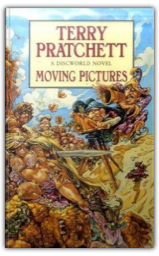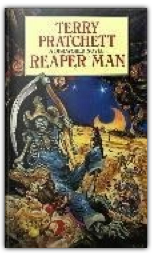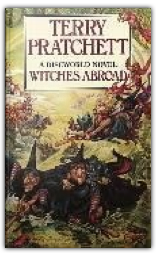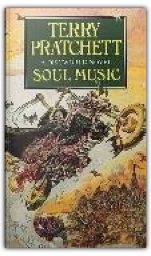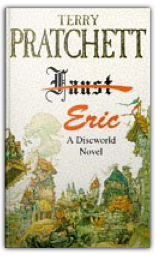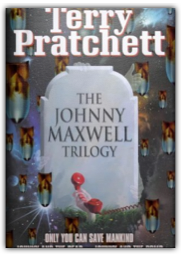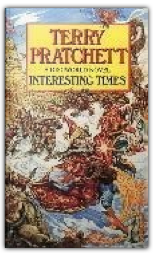 Interesting Times: A Discworld Novel
Terry Pratchett
Interesting Times: A Discworld Novel
Terry Pratchett
Marvellous Discworld, which revolves on the backs of four great elephants and a big turtle, spins into Interesting Times, the 17th outing in Terry Pratchett's rollicking fantasy series. The gods are playing games again, and this time the mysterious Lady opposes Fate in a match of "Destinies of Nations Hanging by a Thread". —Blaise Selby 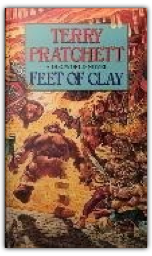 Feet of Clay: A Discworld Novel
Terry Pratchett
Feet of Clay: A Discworld Novel
Terry Pratchett
In Feet of Clay, Terry Pratchett continues the fantasy adventures on Discworld—where anything goes. Anything but murder, that is. Commander Vimes of the Watch must investigate a puzzling series of deaths, with help from various trolls and dwarfs. Pratchett's humour and excellent writing skills draw the reader effortlessly into his zany world. Feet of Clay is 19th in the series. —Blaise Selby 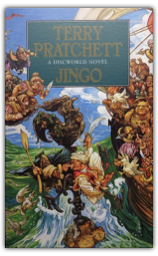 Jingo: A Discworld novel
Terry Pratchett
Jingo: A Discworld novel
Terry Pratchett
Jingo is the 20th of Pratchett's Discworld novels, and the fourth to feature the City Guard of Ankh-Morpork. As Jingo begins, an island suddenly rises between Ankh- Morpork and Al-Khali, capital of Klatch. Both cities claim it. Lord Vetinari, the Patrician, has failed to convince the Ruling Council that force is a bad idea, despite reminding them that they have no army——"I believe one of those is generally considered vital to the successful prosecution of a war." Samuel Vimes, Commander of the City Watch, has to find out who shot the Klatchian envoy, Prince Khufurah, and set fire to their embassy, before war breaks out. 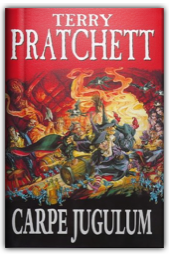 Carpe Jugulum
Terry Pratchett
Carpe Jugulum
Terry Pratchett
Carpe Jugulum is the 23rd Discworld novel, and with it this durable series continues its juggernaut procession onwards. Pratchett is an author who inspires such devotions that his fans will fall on the novel with cries of joy. Non-fans, perhaps, will want to know what all the fuss is about; and that's something difficult to put into a few words. The best thing to do for those completely new to Pratchett is to sample him for themselves, and this novel is as good a place to start as any. But fans have a more precise question. They know that Discworld novels come in one of two varieties: the quite good, and the brilliant. So, for instance, where Hogfather and Maskerade were quite good, Feet of Clay and Jingo were brilliant. While true fans wouldn't want to do without the former, they absolutely live for the latter. And with Carpe Jugulum Pratchett has hit jackpot again. This novel is one of the brilliant ones. 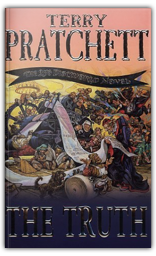 The Truth
Terry Pratchett
The Truth
Terry Pratchett
The Truth is Terry Pratchett's 25th novel about Discworld in general and the dirt-encrusted metropolis of Ankh-Morpork in particular—home of the sinister Patrician, the Unseen University of magicians and guilds for everything from Assassins to Thieves, taking in Clowns (but not mimes) along the way. Ankh-Morpork has weathered several influxes of technology in its time—a demon-inspired invention of the movies, the brief fad for Music with Rocks in it—and now it has acquired a free press, dedicated newshounds, dwarf printers with not especially nasty tempers (for dwarves), and people who want to see their amusing vegetables in the "On a Lighter Note" section. The business of politics (attempts by the old aristocracy to unseat the Patrician) is ratcheted up a notch and Vimes, of the City Watch, is in a worse temper than usual. William de Worde, editor, reporter and investigator, is another attractive Pratchett hero, captured for us in the middle of wonderfully parodied routines from old movies and fiction that he, in his world, is doing for the first time. This is inventive farce with touches of high seriousness and ethical good sense, and two of the nastiest doomed hitmen outside Tarantino. —Roz Kaveney 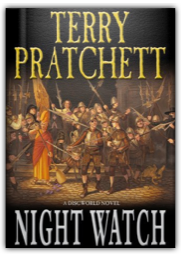 Night Watch
Terry Pratchett
Night Watch
Terry Pratchett
The new Discworld novel Night Watch has the power and energy that characterizes Terry Pratchett at his occasional best, as well as the wild surreal humour he always gives us. Sam Vimes, running hero of the Guards sequence, finds himself cast back in time to the Ankh-Morpork of his youth—a much nastier city, with an actively deranged Patrician and a sadistic secret police—and finding himself filling in for Keel, the tough honest copper who teaches the young Vimes everything he knows. And, more worryingly, who dies heroically in the insurrection Vimes knows to be imminent. With a psychopath from his own time rising in the vile ranks of the Cable Street Unmentionables complicating things, Vimes has to ensure that history takes its course so that he will have the right future to go back to, and to keep his younger self alive—this is Pratchett's plotting at its most thoroughly constructed and wonderfully devious. Ankh-Morpork has for a long time been one of the most thoroughly imagined cities in fantasy—here Pratchett gives us a fascinating gloomy glimpse of its past and of the younger selves of some of his best-loved characters, and of the brief-lived People's Republic of Treacle-Mine Road. —Roz Kaveney |
 Made with Delicious Library
Made with Delicious Library
London, State zipflap congrotus delicious library Scott, Mike
